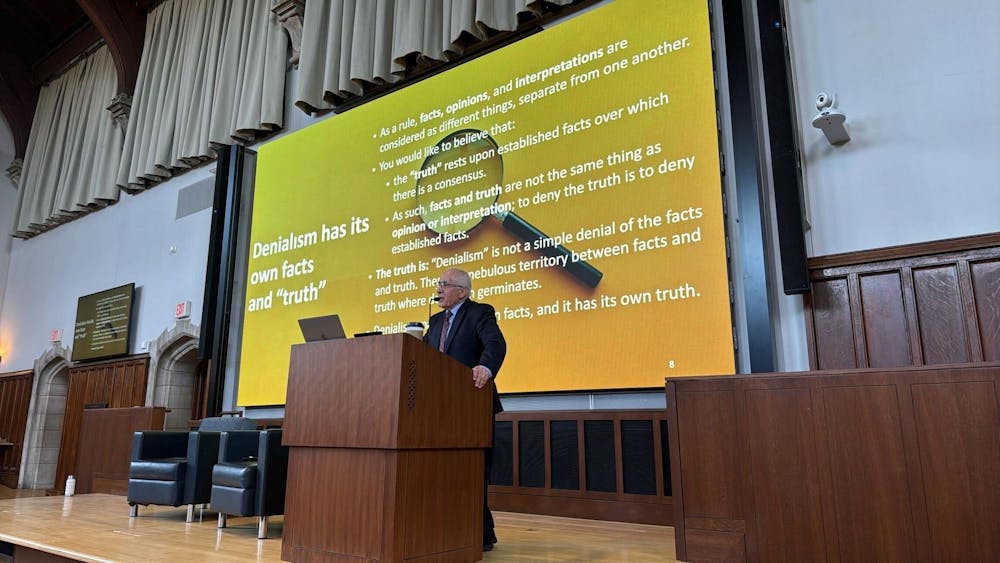Taner Akçam, the inaugural director of the Armenian Genocide Research Program at the University of California, Los Angeles, sat down with the co-president of the Princeton Armenian Society Hayk Yengibaryan ’26 on Wednesday, April 24 to discuss the history and motives for the continued Turkish denial of the Armenian Genocide.
Yengibaryan is an associate Sports editor for The Daily Princetonian.
The talk, which took place in McCosh Hall 50 on Armenian Genocide Remembrance Day, focused on denial of the Armenian genocide, which Akçam described as “an intrinsic part” of how the genocide is remembered. Armenian Genocide Remembrance Day is held annually to honor the victims of the Armenian genocide, during which at least 600,000 Armenians were killed.
Akçam gained notoriety when he became the first Turkish scholar to acknowledge the Ottoman-Turkish genocide of Armenians.
His talk centered around four arguments: that denialism is a major phenomenon, it is an intrinsic part of the Armenian Genocide, it has its own facts and “truth,” and that denialism is not only an ideological attitude toward a past event, but also a structure.
Akçam discussed “the moment of fact and archive creation,” detailing the production of files within the Special Organization and Committee of Union and Progress (CUP), a secret police organization and political party in the Ottoman Empire known for its key role in organizing the genocide.
He also spoke on the establishment of the 1919–1921 Istanbul Military Tribunals, which were created in an attempt to restore peace. Akçam said that these trials were used to prosecute those who had a role in the genocide of Armenians, and some perpetrators were executed.
He mentioned that a common argument among deniers of the Armenian genocide is that there are no original records that document the trials. As a result, deniers believe that the findings of the Military Tribunals — and the Ottoman Empire taking accountability for the Armenian genocide — are fabricated. The notion that these documents did not exist was false, as they were found in 1983.

Akçam refuted this denialist argument in a section of the conversation titled “The moment of proving the falsity of documents.”
Akçam said that the original files contained a coding system which has since been deciphered; these provide evidence of the execution of some Turkish citizens implicated in the trials. According to him, this is an example of his argument that “denialism has its own facts and truth.”
“Denialism is often regarded as a mistaken but tolerable ideological attitude toward mass atrocities,” he said.
In drawing comparisons to American society, Akçam stated that denialism should be considered when people speak about racism.

“We should consider denialism with racism, because it is a structural problem with society. The system, the mindset, and the institution that created denialism, continues today as [in] the case of slavery or racism in American society today.”
Akçam also acknowledged the difficulty in speaking out against the “founding fathers” of the modern Turkish nation, the same government in power during the genocide, but encouraged people to keep making their voices heard.
“Türkiye is a very strong country, they have all the resources to acknowledge and move on [from the genocide],” he said. Akçam believes they do not because of denialism’s influence on the country’s national security system.
Akçam added, “There is a very close connection between Turkish denialism and Turkish national security.” In Türkiye, if people acknowledge the genocide, he said, the Turkish government labels them national security threats and could charge them with treason.
Yengibaryan also shared this sentiment. In a message to the ‘Prince,’ he said that his main takeaway from Akçam’s message was that it is possible to bring people who committed atrocities to justice.
“There is hope in this world for people who seek justice for crimes and genocides, no matter where they come from. For Dr. Akçam, a Turkish scholar, to recognize the genocide, speaks volumes,” Yenigbrayan stated.
Justus Wilhoit is a senior News writer and an assistant Audience editor for the ‘Prince.’
Please send corrections to corrections[at]dailyprincetonian.com.








